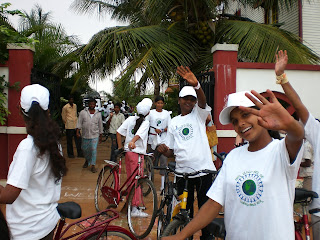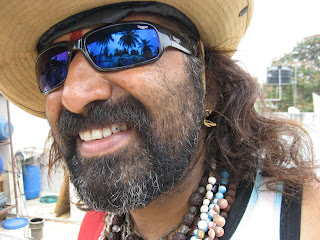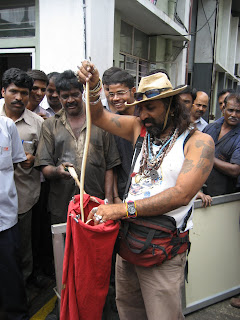
What do you get if you cross 17 Indian teenage girls, 10 do-gooding foreign volunteers, 27 broken bikes, 100 villages, 70 schools, 800 kilometres, 4,800 trees, 2430 plates of rice, a few tonnes of curry and unspecified numbers of head lice? A big fat crazy beautiful, filthy dirty, tragic-comic Indian adventure - and here are some of my personal highlights.

On the 25th of May the Odanadi cycle jatha streamed through the gates of the Mysore Police Commissioner’s office, a peddling snake of sparkly white t-shirts with enthusiastic smiles, cheering and waving to the flash of a hundred journalists’ camera phones. The yellow silk Odanadi flag fluttered proudly from the window of our Jeep escort.

We felt invincible, confidant, bursting with a sense of purpose – but no more than seven seconds later the first girl went headfirst over handlebars and into the gutter. “Oh my god Anitha!” The team of concerned volunteers wailed. “No problem sister,” the Odanadi girls reassured, heads wobbling, “she has never ridden the cycle before isn’t it.” NEVER RIDDEN A CYCLE BEFORE? “How many other girls have never ridden a bicycle before?” Hands shot into the air. I felt sick, but Anitha casually peeled herself off the tarmac and swayed off into a stream of heavy traffic without looking and a lively ‘ding’ of her bicycle bell. Then I remembered: this is India. No rules, no brakes, no expectations, no need to worry, isn’t it?
Not exactly the most auspicious start to the cycle ride, but as we left the crowded highways of Mysore behind us and recovered from the first five accidents and a motorbike crash, we really began to get into our stride. Apartment blocks, belching lorries and supermarkets were replaced by green coconut groves, paddy fields and lumbering ox carts.



The lack of brakes, gears, general fitness and experience proved no obstacle to the resourceful Odanadi girls, who found time to stop at the bottom of every hill, chat to everyone we passed and still take a keen interest in the wellbeing of the foreigners. “Sister your face is red, but your body so white, why?” Because I’m hot. “But before cycle you looking so nice, now a little no-nice. Why?” BECAUSE WE'RE DESPERATELY TRYING NOT TO GET KILLED. On the first day the Volunteers learned that if you want to stay alive on an Indian road you have to follow the Indian ‘Highway Code’, which goes something like:
• Cows are God;
• Overtake everyone, especially on blind corners;
• Never ever check your wing mirrors, unless you are combing your hair and;
• Beep your horn loudly and often, especially if you have one of those fancy ones that plays a tune.
25 kilometres later we arrived at our first destination, just outside the village of Bilikere: two sheds in the middle of a building site. It wasn’t exactly the Savoy, but there was a (sort-of) roof and two barrels of cold water with unidentified bits floating in it. Undeterred, the Odanadi girls screamed, punched the air and jumped around in celebration of their month-long slumber party, while the volunteers looked a little stunned and began tentatively dipping jugs into the scummy ice-cold water for a ‘shower’. “Is this water filtered?” Definitely. “Mosquitoes?” No way. “And toilets?” Al fresco: in the left hand corner of the field where that piss-smell is coming from. As the sun went down over our rustic encampment, we ate cold chapattis with coconut chutney, lit a bonfire and the Odanadi girls sang and danced under the stars to the latest Bollywood song (“move ya move ya move baaaadey, shake ya shake ya shaaaaake ya baaadey”).

“Sister, now you do your country song and dance OK?” said 17 pairs of imploring eyes. At which point most volunteers made their excuses and collapsed on yoga mats, under thin cotton sheets – and prayed for their faces not to get eaten by mosquitoes, rats or cockroaches during the night.

But I don’t want to bore you with the gritty minutiae of every day – or it could start feeling like a month-long episode of Indian Big Brother, minus the booze and the big posh house. The first few days went by in a blur of sweaty cycling on pink bikes through lush paddy fields, remote villages and dusty towns, dodging herds of goats and trains of camels.

None of our cycles had gears – and most of them didn’t have brakes either, so there was a lot of stopping in the shade to recover from minor road accidents, broken chains, to dip cheap glucose biscuits in sweet cups of chai.

Breakfast, lunch and dinner (rice, rice and rice) was provided for us by supporters as we made our way through Karnataka: temples, monasteries, schools, community halls, NGOs, tribal organizations and government hostels. In return, we planted mango trees, performed songs and distributed leaflets to raise awareness about human trafficking.

We were hardly inconspicuous. Groups of skinny boys on motorbikes would zoom past smacking their lips at 30 female arses struggling up a hill. “SISTER!” the Odanadi girls would whine, “Those boys are ragging us!” In India “ragging” isn’t an Eighties paint-effect, it means someone taking the piss out of you. “Just ignore them,” I would say in my best do-gooding, stoic volunteer voice. But when you’ve been cycling uphill for 30 kilometres in 40 degree heat with a plastic saddle wedged up your arse crack and a greasy shitbag in a vegetable lorry starts blowing you kisses all you really want to say is ‘GO AND FUCK YOURSELF YOU FUCKING PERVERTS,’ but then I remembered we were NGO ambassadors and we had to set a good example and kept reminding myself that the closest most of these men have come to a Western woman is in porno mags and Fair and Lovely TV commercials. It’s not their fault TV has taught them that all Western women are whores.
Strange rumours about the cycle team would circulate in each village where we stopped. People would stand in doorways pointing at the “AMERICANS”. They were convinced that we were either Hollywood actresses or worked at The White House. “AFRICAN?” they would stage whisper, wagging their fingers at the black (Belgium) volunteer. “No Belgium,” she would explain. “No, you African,” they would insist. “And she - CHINESE” they would stage whisper and point at the Korean-American college student. Even the local Indian newspapers started running stories based on our group of Chinese, American and African Hollywood actresses and White House employees, with grinning photographs of us taken on mobile phones.
And it wasn’t just the locals who were bewildered. Over the course of 30 days Volunteers and Odanadi girls had a lot to learn about each other from each side of the cultural divide. For the most part we were one big happy family, but a few things were bound to get lost in translation. “Why you country peoples no marriage? Why toilet paper? Why red skin? Why pimples? Why reading book? Why no good cloth washing and dirty t shirts?” Some situations got pretty awkward. Like when one of the older female volunteers got stomach cramps, crouched by the side of the road to get water from her bag – and found that her emergency sachets of chocolate glucose syrup had exploded all over her hands. “Oh my god oh my god! Canadian sister has made loose motions, all over her hands!” whispered 17 girls, eyes bulging, cycling up and down the line making sure everyday knew just what was going on. The whole cycle ride was in uproar. “DO SOMETHING SISTER! Come quick, Canada Sister’s monthly-problem is coming all over her hands, she needs to take bath!” No, no don’t worry Canada sister has just got chocolate… oh never mind.
Bathing was another big issue on the cycle ride. Apparently the volunteers didn’t do it enough because we were determined to Rough It (“Sister please at least body washing? They would plead), while the Odanadi girls did it as much and as often as possible because most of them have Roughed It for their entire lives and the novelty had kind of worn off.
But bathing wasn’t the most comfortable experience for Western volunteers, used to mod cons like ‘taps’ and ‘privacy’.
About ten days before the end of the cycle, we were all allocated village families to stay with.

After a cosy night spooning in bed with two Odanadi girls, Sindhu, Ramya, the mother, daughter and their two mates from next door, the girls were keen to get me clean. “You first sister, ok?” They pointed to the corner of the dimly lit hut, where I could see a small concrete wall, surrounding a plughole and a bucket of water. “Where do I wash though?” It all suddenly became clear: I was going to have to crouch naked in the corner of a room full of strangers to wash in a bucket – while they all watched.

I tried not to look fazed as I casually took off all my clothes behind a small towel. How was I going to do this without offending them, without confirming all their worst suspicions about slutty Western women? Two heads poked around the concrete wall. “Sister, what is this?” they asked pointing at the towel. “Go a-way” I said, panicking and hastily splashing jug fulls of water under the soaking towel. My washing method wasn’t very convincing. Suddenly four more pairs of eyes joined them to watch the poor pale skinned prude desperately trying to save her battered dignity with dishcloth. “FINISHED!” I laughed, “it’s traditional to wash like this in England, we’re a very private nation.” When it was time for Sindhu and Ramya to wash, they simply took off all their clothes and stood naked while the mother of the family poured warm jugs of water over their hair. Then I felt really stupid.
Very little seemed to get under the skin of the Odanadi contingent, most of whom have been through a lot worse than hard floors and dirty toilets. Like when the entire cycle ride became infested with head lice.

“AAAAGGGGGGHHHHHHHHH!” came the scream from down the corridor of a seedy government hostel where we were staying. It sounded like a Greek tragedy out there. “SISTER! American sister has head lice, she very crying,” explained an extremely bemused Shamala. “She is telling she has disease and she wants to go back to America. Why?” Every volunteer started panicking. “No one told us the girls have head lice, how could this have happened?’ came the cries. We gathered everyone in a room. “OK, who here has head lice?” I asked the girls to raise their hands. “ME SISTER!” came a chorus of seventeen voices.

In India, death, disease and head lice are always pretty close at hand. There’s no escaping the harsh realities of life, as the team of plucky volunteers discovered one Saturday morning when we woke to the scream 20 goats being sacrificed in the temple next door to our hostel. In a matter of seconds everyone crowded around to watch the next quivering victim, rope tied round its neck, flailing desperately in a bright pool of blood. “THAT’S DISGUSTING!” the volunteers wailed, as a couple of dogs started nonchalantly lapping at the pools of gore on the temple steps. “Yes sister,’ agreed the Odanadi girls, unconvincingly. “Look sister, knife is coming,’ said Anitha, who is perhaps the most unflappable girl on the planet. The butcher held a huge rusting machete over the goat’s neck and tapped it slowly. “One, two, three…dead,” said Anitha calmly, as the knife came down and sliced its head clean off. I stared transfixed as the headless body of the goat twitched violently and tried to make a run for it. “Don’t worry sister,” said Anitha, “body still moving, but goat is dead”.
But unlike the goats, the Odanadi cycle jatha made it back into the city of Mysore with bodies, bikes and sanity (almost) in tact. The last afternoon was never-ending. Struggling against monsoon wind and rain we cycled around the busy ring road with punctures, broken pedals and a missing saddle.

But finally at about 6pm, as we rode across the dusty scrubland with the pelting rain in our eyes, the white roof of Odanadi came into view. My legs were jelly and my nerves were in tatters, but as we got closer, we heard the sound of 60 Odanadi children screaming and cheering from outside the gates, “welcome home sisters!”

Afterwards I felt like the goat: body still moving, but dead. I didn’t even cycle for the full 30 days, but for those that did I was amazed that despite rainstorms, heatwaves, accidents, injuries, cold floors, cold buckets – everyone survived. The volunteers who had never been to India before, the Odanadi girls who had never ridden a bike before; victims of brothels, pimps, gutters and worse – they all made it. In fact it was such a success the Odanadi founders are thinking about doing a cycle ride for the mentally ill residents next year. Any takers?
























